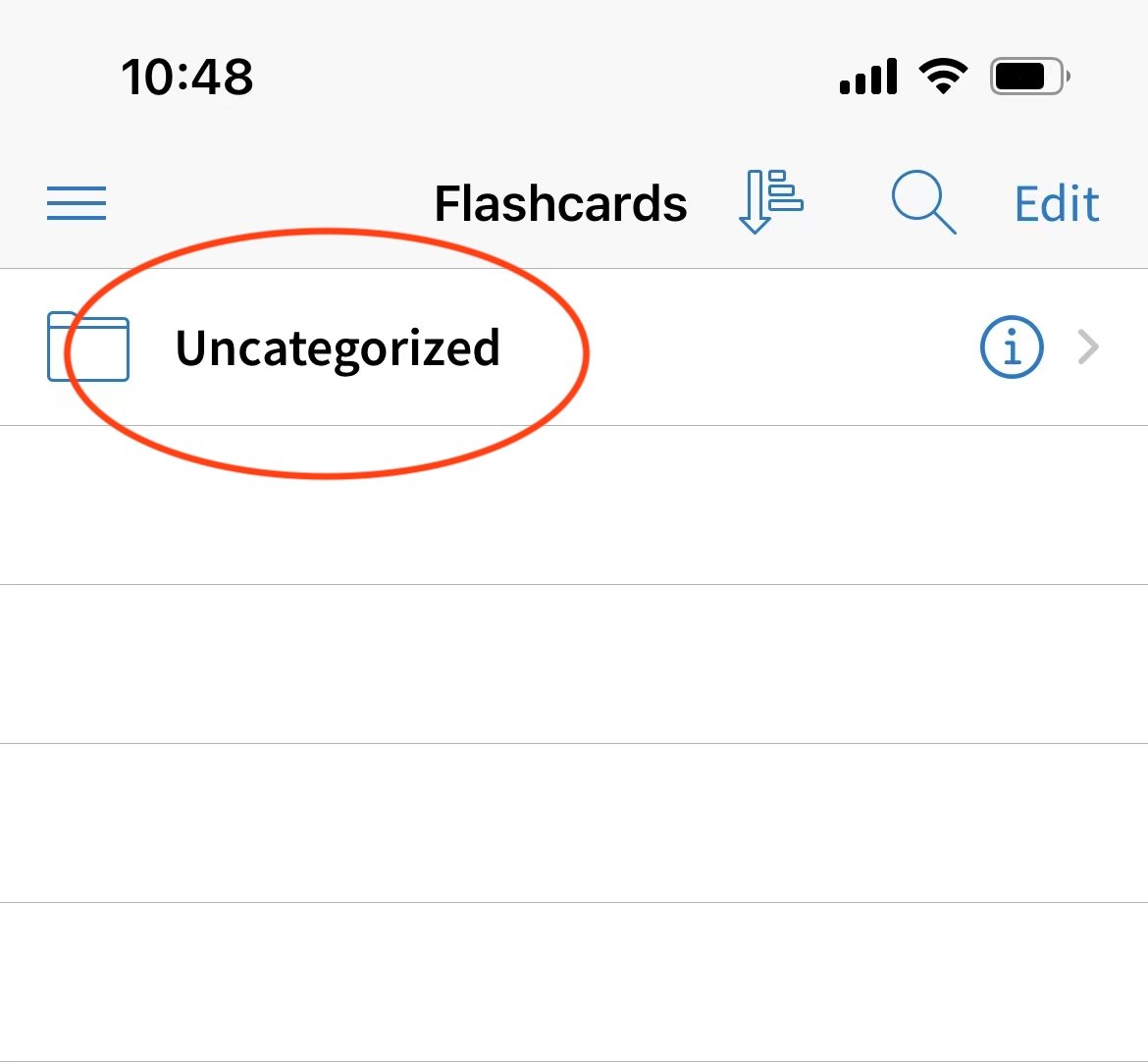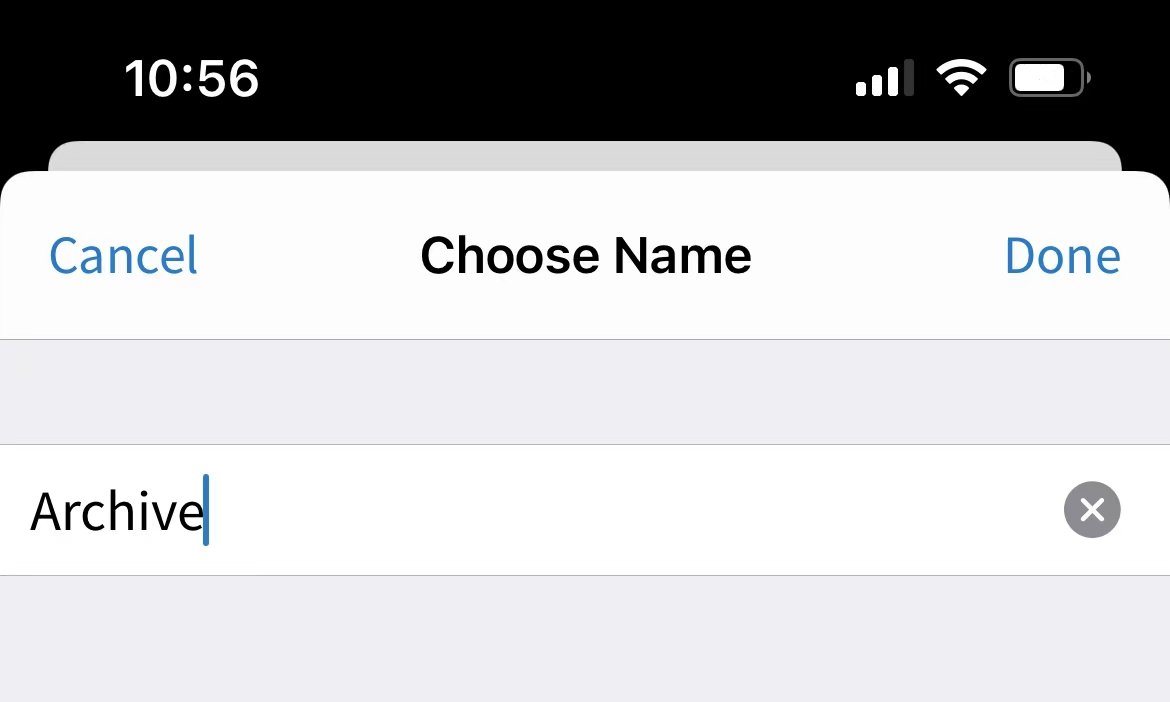The Best Way to Organize Flashcards in Pleco
Pleco is a great Chinese dictionary app, and its flashcards add-on allows you to do quite a lot. (If you’re not sure how to get it up and running, check out our blog post on setting up Pleco flashcards.) When it comes to organization, the app is powerful enough to allow for all kinds of categorization and sub-categorization, and there are probably some good use cases for those. But it doesn’t mean that the average learner needs to spend a ton of time on organizing flashcards.
The Case for Uncategorized
If you haven’t spent any time organizing your Pleco flashcards, you should know that every word you save will go into a folder called “Uncategorized” by default. It looks like this:
Kind of feels like you did something wrong, right? Like why didn’t you categorize that vocabulary???
There’s nothing inherently wrong with uncategorized words, though. It’s just a label (technically a lack of a label), not a judgment.
In fact, for most learners, just sticking with this single “uncategorized” category is the best way to go. Since you’ve already set up your flashcard review sessions to use “Spaced Repetition,” adding additional categories is likely unnecessary or even a hindrance to total coverage with your reviews.
This is because when you used spaced repetition, the app chooses all the words that are due for review for you, and doesn’t need to consider what “category” they are. Isn’t urgency of review—to review first what needs to be reviewed most urgently—the most important factor? Adding in further categories will likely just complicate everything. Rather than choosing what to review based on a category, it makes more sense to just review everything that needs reviewing all at once. Hence “Uncategorized” is your choice.
Multi-Category Review
It’s also worth noting that you may have more than one source of words. Many learners will casually review an HSK word list while also saving and reviewing other vocabulary that means more to them. This is not a bad idea at all, even though we recommend limiting the “batch imported” vocabulary as much as possible. Your categories might look something like this:
If you’d like to avoid managing different flashcard review sessions, we recommend “New Test” and then choosing multiple categories to test. (There’s a button at the bottom to “Select All.”) Then try not to change this setting unless something is very wrong. This way you still don’t have to manually manage anything every time you want to review your flashcards.
(You may find that the imported vocabulary is clogging up your review sessions, though, and making the whole process less enjoyable. If this is the case, see the section below on the “Archive” idea.)
The Categorization Trap
There are several reasons to be wary of categorizing all of your words.
The first is that if you’re serious about your studies, pretty soon you’re going to be dealing with a lot of words. You might not realize what you’re committing to. If you categorize your first 1000 vocab words, but then slack off for the second 1000, what then? Some personality types will feel like they have to find time to categorize those uncategorized 1000 words, which they don’t really want to do, which in turn leads to not studying at all (or at least not using he flashcards at all). Not ideal!
Other personality types like to categorize words and don’t fall behind. As the number of words in each category grows, the learner may even start sub-categories. A category for everything, and every word in its place! The problem is that over time, this learner will start to realize that a lot of time is going into categorizing (and sometimes re-categorizing), and not enough into actually reviewing the flashcards. It’s a bit like the “Bookshelf Problem” that some learners have with books. This is the trap. If you’re an organizer by nature, you might benefit a lot from nipping this one in the bud and not committing yourself to endless categorization.
The final reason is just related to efficiency and the spaced repetition algorithm. You don’t need to categorize your vocabulary. Bit you do need to review it periodically or you’re going to forget it. Managing categories may interfere with the spaced repetition algorithm or with the regular review of the flashcards. So just don’t mess with it. Keep it simple. Keep words uncategorized.
Sometimes You Need an Archive
Some learners may be with us so far, but have another issue: over time, the Uncategorized “bucket” of cards starts to accumulate a lot of junk. These are words that seemed useful when you first added them, but actually they’re not seeing a lot of use at all. You don’t want to simply delete them because they were added from a real-world situation, but on the other hand, they’re really making your flashcard reviews unpleasant because you can’t ever remember them and you also don’t feel like you need them.
The solution? Stick with reviewing only “Uncategorized” for flashcard reviews, but also create an “Archive” category. You can think of this as something like an “archive” function in Gmail or Google Photos. You archive it because you don’t want to keep seeing it, bu you also don’t want to delete it.
Remember: you don’t ever have to review the words in this “Archive” category. They’re just there. Chilling. Just in case you ever need them. (You probably won’t.)
You might want to get fancy and create multiple types of archives, but beware the “Categorization Trap” (detailed above). It applies here as well. You’ll probably be just fine with “Uncategorized” for review and a single “Archive” category as a final (?) resting place for those stubborn words you don’t really need to be reviewing.
Treating the Imports Separately
Finally, we should mention that some learners like to treat HSK vocabulary separately. They want to pass the HSK, even though they don’t find that goal super personally fulfilling. They’re working on their own direction with their Chinese studies, but they want to pass the HSK test too. In this case, it may make sense to make one more modification:
Keep “Uncategorized” for normal reviews
Keep “Archive” for cleanup of “Uncategorized”
Also have an imported HSK Word List
For this setup, you can either review the “Uncategorized” and HSK words together (see “Multi-Category Review” above), or review the two separately (which works best if you’re really trying to contain your HSK study sessions).
You may also consider sticking with mainly “Uncategorized” for reviews, and then moving select words from your full imported HSK list into an “HSK Focus” category that you can group with “Uncategorized” for your regular reviews. Keeping the HSK vocabulary to a minimum can really help your flashcard reviews maintain focus.
KISS
The guiding principle here is “Keep It Simple, Stupid.” Of course you’re not stupid, but you wouldn’t be the first smart person to spend hours categorizing words instead of studying.
Try to do the simplest thing. Make it more complicated only when you need to.
Start with just “Uncategorized” and see how it goes!





